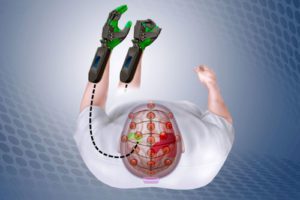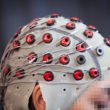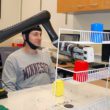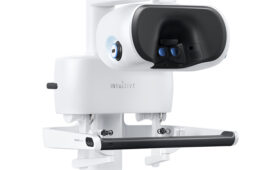
Jarod Roland, a medical resident, tries out a device that detects electrical activity in his brain and causes his hand to open and close in response to brain signals. [Photo credit: LEUTHARDT LAB]
The researchers analyzed the use of Ipsihand, developed by Neurolutions.
The brain-computer interface helps participants train uninjured parts of the brain to take over injured brain functions, which can lead to meaningful recovery. The study was published in the May 26 issue of the journal Stroke.
The news is but the latest in a string of recent research advances related to mind-control. University of Minnesota researchers, for example, have developed a non-invasive way to control robotic arms by simply thinking about them, and MIT and Boston University researchers are also working on mind-controlled robots.
The technology takes advantage of a quirk in how the brain controls the movement of the limbs. In general, areas of the brain that control movement are on the opposite side of the body from the limbs they control. About a decade ago, however, the research team discovered that a small area of the brain played a role in planning movement on the same side of the body.
 To move the left hand, specific electrical signals indicating movement planning first appear in a motor area on the left side of the brain. Within milliseconds, the right-sided motor areas become active, and the movement intention is translated into the actual contraction of muscles in the hand.
To move the left hand, specific electrical signals indicating movement planning first appear in a motor area on the left side of the brain. Within milliseconds, the right-sided motor areas become active, and the movement intention is translated into the actual contraction of muscles in the hand.
A person whose left hand and arm are paralyzed has sustained damage to the motor areas on the right side of the brain. But the left side of the person’s brain is frequently intact, meaning many stroke patients can still generate the electrical signal that indicates an intention to move. The signal, however, goes nowhere since the area that executes the movement plan is out of commission.
The researchers say that if they can couple those motor signals new connections can be made in a patient’s brain. The device they designed comprises a cap that contains electrodes to detect signals in the brain, a computer that amplifies the signals, and a movable brace that fits over the paralyzed hand. The device detects the wearer’s intention to open or close the paralyzed hand, and moves the hand in a pincer-like grip, with the second and third fingers bending to meet the thumb.
The study results indicate that the Ipsihand device doesn’t recover full hand mobility. However, it can restore grasping and using the opposable thumb, which researchers say is still a benefit.
[Want to stay more on top of MDO content? Subscribe to our weekly e-newsletter.]





![A photo of the Medtronic GI Genius ColonPro polyp detection system flagging a potential sign of colon cancer during a colonoscopy. [Photo courtesy of Medtronic]](https://www.medicaldesignandoutsourcing.com/wp-content/uploads/2024/04/Medtronic-GI-Genius-doctors-268x170.jpg)
